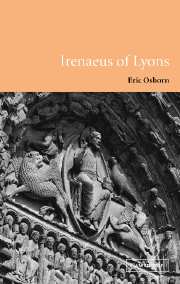Book contents
- Frontmatter
- Contents
- Preface
- List of abbreviations
- Chapter 1 Irenaeus: argument and imagery
- Part I DIVINE INTELLECT
- Part II ECONOMY
- Part III RECAPITULATION
- Part IV PARTICIPATION
- Chapter 7 Logic and the rule of truth: participation in truth
- Chapter 8 Scripture as mind and will of God: participation in truth
- Chapter 9 Aesthetics: participation in beauty
- Chapter 10 Human growth from creation to resurrection: participation in life
- Chapter 11 Goodness and truth: ethics of participation
- Part V CONCLUSION
- Appendix: Gnosticism
- Select bibliography
- Citations from Irenaeus
- Citations from the bible
- Index of classical authors
- Index of patristic authors
- General index
Chapter 10 - Human growth from creation to resurrection: participation in life
Published online by Cambridge University Press: 22 September 2009
- Frontmatter
- Contents
- Preface
- List of abbreviations
- Chapter 1 Irenaeus: argument and imagery
- Part I DIVINE INTELLECT
- Part II ECONOMY
- Part III RECAPITULATION
- Part IV PARTICIPATION
- Chapter 7 Logic and the rule of truth: participation in truth
- Chapter 8 Scripture as mind and will of God: participation in truth
- Chapter 9 Aesthetics: participation in beauty
- Chapter 10 Human growth from creation to resurrection: participation in life
- Chapter 11 Goodness and truth: ethics of participation
- Part V CONCLUSION
- Appendix: Gnosticism
- Select bibliography
- Citations from Irenaeus
- Citations from the bible
- Index of classical authors
- Index of patristic authors
- General index
Summary
Irenaeus' anthropology, his optimism for man, has long excited enthusiasm. At the Renaissance he inspired Erasmus. In the twentieth century he gave fuel to those who, like Teilhard de Chardin, were driven by science to see man's evolution to Christ as the Omega point. The dogma of original sin was to be discarded and there was hope for all. On examination, however, Irenaeus proved more complex. The great theme of man as the image of God seemed to lack cohesion. Sin was still an awesome evil. How could divine spirit be mixed with body and soul? Through it all Irenaeus argued his way to the triumph of resurrection and life eternal. He holds our attention because of his passionate enthusiasm that mortal man should participate in the life of God. Controversy has centred on four problems: image and likeness, sin and fall, breath and spirit of God, flesh and spirit.
IMAGE AND LIKENESS: THE PUZZLE
The terminology of image and likeness was widely present in Greek philosophy from Plato to the Stoics. Here man's rational principle was the image of God, and likeness to God was acquired by perfection of this reason. Early Christian writers changed this and defined perfection by the gift of the divine spirit and salvation (4.20.6).
Recapitulation restores the divine image and likeness which was lost in Adam. Likeness to God is found in the incarnate word of God (dem. 32; 3.18.1), the image from which the creation of man was taken (dem. 22).
- Type
- Chapter
- Information
- Irenaeus of Lyons , pp. 211 - 231Publisher: Cambridge University PressPrint publication year: 2001



